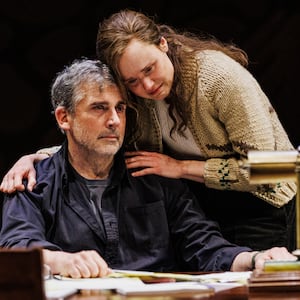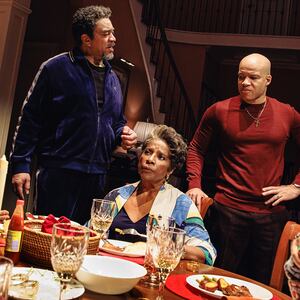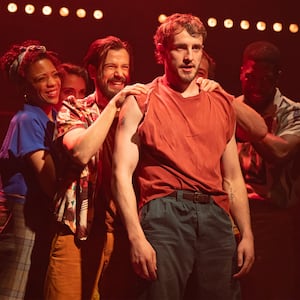When Andrew Scott appeared on stage, a voice behind me breaking the sudden silence perhaps spoke for many in attendance: “He’s so beautiful.”
Scott starts his one-man Vanya (Lucille Lortel Theatre, through May 11) gazing out at the audience—indeed handsome, and mischievous twinkling eye on subtle blast—switching the house lights on and off until they are to his liking. It’s a moment of both comedy and assertion: a nod that this is a performance in a theater (one hour, forty minutes, no intermission), but that this is also his performance, his construct.
Adapted from Chekhov’s Uncle Vanya by Simon Stephens, directed by Sam Yates, and designed by Rosanna Vize—with all three listed as co-creators—this off-Broadway production premiered in London in 2023. It’s part of a creative endurance-test trend of big-name actors taking on texts playing multiple characters—among them, Eddie Izzard doing Great Expectations and Hamlet, while on Broadway this season Succession star Sarah Snook is performing another multi-character Brit-import, The Picture of Dorian Gray, in the wake of Jodie Comer’s Tony-winning Prima Facie in 2023.
Vanya is an inviting showcase for the charismatic and talented star of Ripley, All of Us Strangers, Fleabag, and Sherlock—eight characters, all genders and ages, with enough drama, angst, and illicit passions to craft some standout scenes around.

This is Uncle Vanya, basically faithful yet meaningfully tweaked. The stage design is not 19th-century Russia but modern-day indistinct rehearsal room meets indistinct domestic setting. There’s a kitchen, some sundry seating, and a stage door to nowhere allowing Scott transitional moments to underline character and scene shifts (and give Scott the occasional second to himself). We are on an Irish farm rather than country estate; some names and professions of characters have been changed.
A working knowledge of Uncle Vanya is recommended; Scott’s performance is both showy and unshowy—a panoply of actorly skills and control—but sometimes the exercise feels too subtle. The transitions between scenes and characters can be confusing.
Approach it instead as a showcase and masterclass, a chance to see the talented and charismatic Scott close-up. He has fun imagining housekeeper Maureen (a substitute for Marina the nurse), who with cigarette in hand is always jabbering on about the various intrigues around her.

Then there is Vanya himself, here called Ivan, and brother-in-law Alexander (no longer a professor as Chekhov had him, but an artistically precious film-maker), who has arrived with his younger second wife Helena. Hovering as usual is poor, plain Sonia, Alexander’s “plain” daughter (Scott evokes hers and Helena’s spiky conversations very well) and Elizabeth, Ivan’s mother (named Maria by Chekhov). Grief for Anna, Ivan’s sister, is conveyed by the memories represented by a piano Ivan observes and sometimes plays.
A moment of passion between Helena and Michael, the endlessly whining, but very hot doctor who really should strike out on his own and get out of there, is the very distillation—the very necessary distillation—of self-love, as Scott grabs and lustily sighs over his own body. Disrobed, he also imagines their illicit encounter being interrupted.
This is all fascinating to watch as Scott stalks, dances, pouts, and slinks around the stage traversing genders and ages, but the exercise does not reveal Uncle Vanya anew. As engaging and adept a performer as Scott is, Vanya is a practically impressive but theatrically mixed experience. It doesn’t yield anything new from Chekhov’s text, sometimes it even muddies it; it feels more stylish performance exercise than illuminatingly innovative.
The original play can drag—a traditionally multi-cast Lincoln Center production last year also ran aground—and having the brilliant Scott play all the characters doesn’t animate it further. Scott’s Vanya is virtuosic in spirit, but it also feels oddly aimless—its fundamental reason to be squarely down to the star name on the Lucille Lortel marquee.









